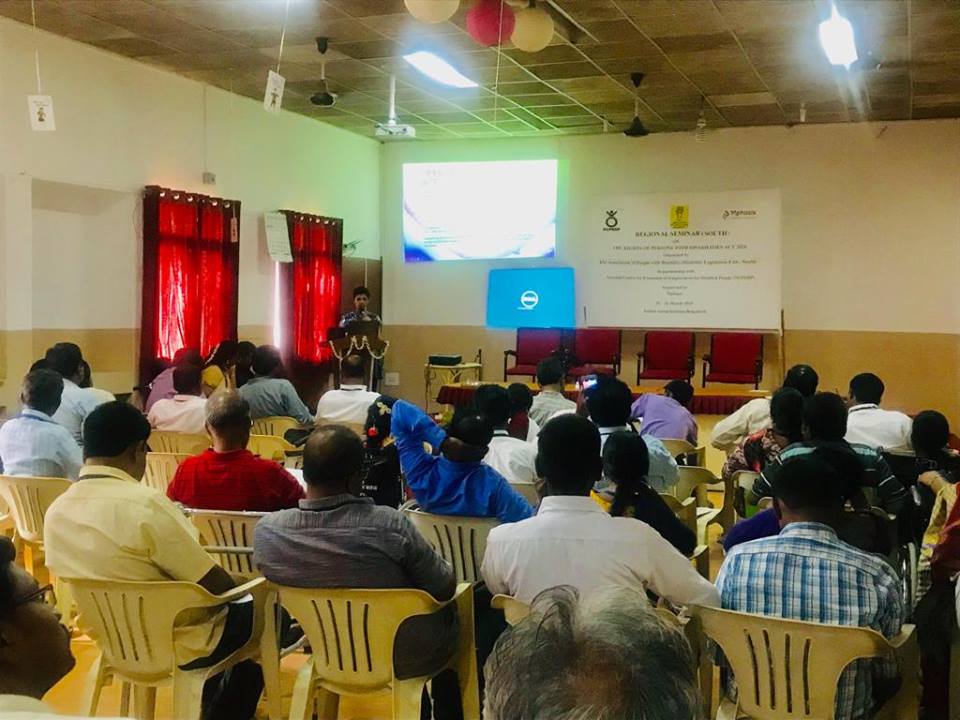On 26th March 2019, the Association of People with Disabilities (Disability Legislation Unit-South) in collaboration with the National Centre for Promotion of Employment for Disabled People (supported by Mphasis) conducted a regional seminar on The Rights of Persons with Disabilities Act, 2016 at the Indian Social Institute Bangalore.

Deekshitha Ganesan, a Research Associate at CLPR, addressed the audience on Legal Capacity and Institutional Care. In particular, the presentation provided a comparative perspective on legal capacity of persons with disabilities under the Rights of Persons with Disabilities Act 2016 (RPD Act), National Trust for the Welfare of Persons with Autism, Cerebral Palsy, Mental Retardation and Multiple Disabilities Act, 1999 (NT Act) and the Mental Health Care Act, 2017.
Section 13 of the RPD Act recognises that persons with disabilities have legal capacity with respect to financial matters, inheritance etc. It provides that the Government must undertake suitable measures to enable persons with disabilities to enter into financial contracts and own property in their name without any discrimination. The statute also mandates that persons with disabilities should have legal capacity on par with others. Section 14 provides for limited guardianship of persons with disabilities where they require additional support or assistance. The limited guardian is expected to act based on mutual trust and decisions with the consent of the persons with disabilities who appoint them.
However, the RPD Act does not lay down the procedure by which one can appoint a limited guardian. Further, it does not specify who has to make the application for guardianship. While one method of doing so could be to execute a Power of Attorney, detailed guidelines are awaited from the Central and State Governments in this regard.
The NT Act, 1999 however, provides for the setting up of the board to cater to the needs of the people with disabilities included under the act. The Government provides financial support to the board and board constitutes committees to approve guardianship applications for persons with disabilities. An application may be made by the parents, relatives, or even a registered organisation (in that order). However, the legislation has not recognised legal capacity as substantive right of persons with disabilities.
The Mental Health Care Act, 2017 was enacted after a long drawn struggle and aims to minimise the stigma around mental health. The law aims to ensure that persons with mental illness receive dignified treatment and are not subjected to discriminatory practices while availing rehabilitation in health care institutions. Section 5 enables persons above the age of 18 years to make advance directives on the mental health care they should receive in the event they cease to have capacity to make such decisions. They can also appoint persons who will act as nominated representatives on their behalf to make decisions on treatment and admission into medical institutions. The Act emphasises on taking the informed consent of the person with disability and the nominated representative, as the case may be, before performing any treatment.
The RPD Act clearly recognises the legal capacity of people with disabilities. This is in accordance with Article 12 of the United Nations Convention on the Rights of Persons with Disabilities, 2006 which also recognises legal capacity and calls for member states to provide protection to people with disabilities. While all guardians appointed under any other law before April 2017 (when the RPD Act came into effect) would be limited guardians, the RPD Act does not clarify the status of guardians appointed under other laws after its enactment. This is particularly crucial as it also does not provide for any procedure to appoint guardians.
The Mental Health Act, 2017 also acknowledges the legal capacity of persons with disabilities but allows for the nominated representative to take decisions on behalf of the person with disability in some emergency cases. The NT Act, on the other hand, largely provides for the procedure of appointing guardians and does not comment on the legal right itself.
The onus lies with the Central and State Governments to create clear rules and guidelines on appointment of legal limited guardians. Further, it must generate awareness on mental health issues and legal capacity, particularly in rural areas with the assistance of civil society organisations which work at the grass root level to address the stigma attached with mental health in India. We all are temporarily-abled bodies and could experience disability in our lifetime. We thus need to remain sensitive and shed our pre-conceived biases against persons with disabilities.
Author: Avinash Shahi Research Associate, Centre for Law and Policy Research
